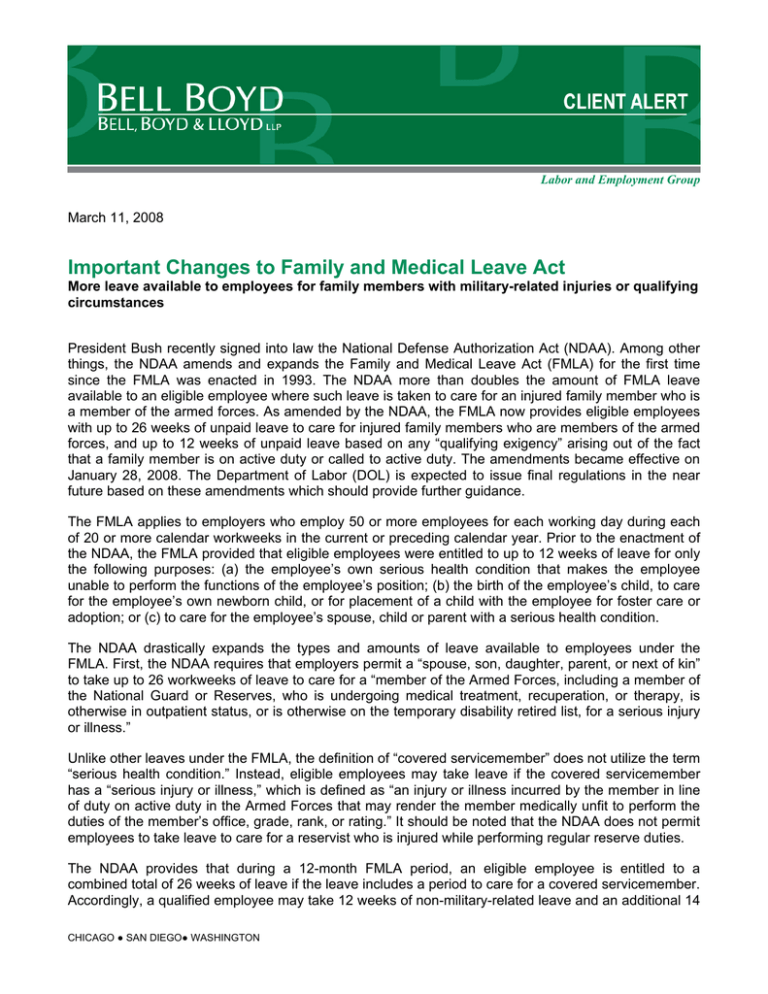
Labor and Employment Group
March 11, 2008
Important Changes to Family and Medical Leave Act
More leave available to employees for family members with military-related injuries or qualifying
circumstances
President Bush recently signed into law the National Defense Authorization Act (NDAA). Among other
things, the NDAA amends and expands the Family and Medical Leave Act (FMLA) for the first time
since the FMLA was enacted in 1993. The NDAA more than doubles the amount of FMLA leave
available to an eligible employee where such leave is taken to care for an injured family member who is
a member of the armed forces. As amended by the NDAA, the FMLA now provides eligible employees
with up to 26 weeks of unpaid leave to care for injured family members who are members of the armed
forces, and up to 12 weeks of unpaid leave based on any “qualifying exigency” arising out of the fact
that a family member is on active duty or called to active duty. The amendments became effective on
January 28, 2008. The Department of Labor (DOL) is expected to issue final regulations in the near
future based on these amendments which should provide further guidance.
The FMLA applies to employers who employ 50 or more employees for each working day during each
of 20 or more calendar workweeks in the current or preceding calendar year. Prior to the enactment of
the NDAA, the FMLA provided that eligible employees were entitled to up to 12 weeks of leave for only
the following purposes: (a) the employee’s own serious health condition that makes the employee
unable to perform the functions of the employee’s position; (b) the birth of the employee’s child, to care
for the employee’s own newborn child, or for placement of a child with the employee for foster care or
adoption; or (c) to care for the employee’s spouse, child or parent with a serious health condition.
The NDAA drastically expands the types and amounts of leave available to employees under the
FMLA. First, the NDAA requires that employers permit a “spouse, son, daughter, parent, or next of kin”
to take up to 26 workweeks of leave to care for a “member of the Armed Forces, including a member of
the National Guard or Reserves, who is undergoing medical treatment, recuperation, or therapy, is
otherwise in outpatient status, or is otherwise on the temporary disability retired list, for a serious injury
or illness.”
Unlike other leaves under the FMLA, the definition of “covered servicemember” does not utilize the term
“serious health condition.” Instead, eligible employees may take leave if the covered servicemember
has a “serious injury or illness,” which is defined as “an injury or illness incurred by the member in line
of duty on active duty in the Armed Forces that may render the member medically unfit to perform the
duties of the member’s office, grade, rank, or rating.” It should be noted that the NDAA does not permit
employees to take leave to care for a reservist who is injured while performing regular reserve duties.
The NDAA provides that during a 12-month FMLA period, an eligible employee is entitled to a
combined total of 26 weeks of leave if the leave includes a period to care for a covered servicemember.
Accordingly, a qualified employee may take 12 weeks of non-military-related leave and an additional 14
CHICAGO ● SAN DIEGO● WASHINGTON
weeks of military-related leave. It is unclear at this time whether the 26 weeks of leave available to
eligible employees to care for covered servicemembers is a recurring leave or a one-time-use leave.
Second, the NDAA provides that an eligible employee may take up to 12 weeks of unpaid leave if the
employee’s spouse, child or parent is on active duty in the military or is a reservist who faces recall to
active duty if there is a “qualifying exigency.” The term “qualifying exigency” is not defined, but
Congress’ intent appears to have been to provide servicemembers with familial support in the event
that they need assistance with childcare, financial and similar issues prior and subsequent to active
duty. Employers are not required to provide this type of leave until the DOL issues final regulations
defining “qualifying exigency.” Until such regulations are issued, however, the DOL encourages
employers to provide this type of leave to qualifying employees.
Like other FMLA leave, the employer may require, or the employee may elect, the substitution of any of
the employee’s accrued paid leave for any part of the 26-week period. Also, the employee must provide
“reasonable and practicable” notice to the employer in the event of a need for leave. The employer may
require that the employee’s request for leave be supported by a certification.
Employers should be aware that the leave provided under the NDAA may be in addition to leave
required under state law. For example, the Illinois Family Military Leave Act requires employers who
have between 15 and 50 employees to provide up to 15 days of unpaid leave to eligible employees who
are either the spouses or parents of soldiers being called into active duty. Employers with more than 50
employees must provide up to 30 days of leave to such employees. Several other states require unpaid
family military leave, including California, Indiana, Maine, Minnesota, Nebraska and New York. Other
states, including Hawaii and Wisconsin, have family military leave pending before their state
legislatures. It is unclear whether NDAA leave is in addition to or runs concurrent with leave under such
state laws.
The DOL issued proposed regulations based on the NDAA on February 11, 2008. See 73 Fed. Reg.
7876. Comments regarding the proposed regulations must be submitted to the DOL on or before April
11, 2008.
In light of this new legislation, employers should review and amend leave policies to comply with the
changes to the FMLA. Also, until the final DOL regulations are issued, employers should proceed with
caution in addressing an employee’s request for military-related leave, and in assessing discipline for
attendance infractions for employees with family members in the military.
For further information, please contact James P. Daley (312-807-4224, jdaley@bellboyd.com), Robert R. Brown (312-8074266), rbrown@bellboyd.com), or Pete Morrison (312-807-4258, jmorrison@bellboyd.com).
This publication has been prepared by the Labor and Employment Group of Bell, Boyd & Lloyd LLP for clients and friends of
the firm and is for information only. It is not a substitute for legal advice or individual analysis of a particular legal matter.
Readers should not act without seeking professional legal counsel. Transmission and receipt of this publication does not
create an attorney-client relationship.
© 2008 Bell, Boyd & Lloyd LLP All Rights Reserved
www.bellboyd.com
70 West Madison Street
Chicago, Illinois 60602
t. 312-372-1121
f. 312-827-8000
3580 Carmel Mountain Road
San Diego, California 92130
t. 858-509-7400
f. 858-509-7466
1615 L Street, N.W.
Washington, D.C. 20036
t. 202-466-6300
f. 202-463-0678

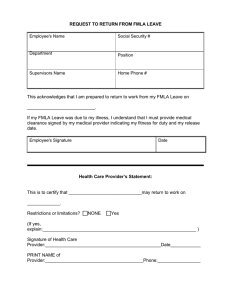
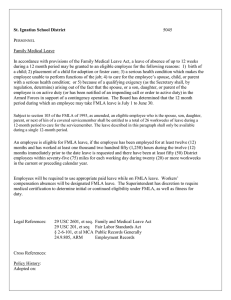
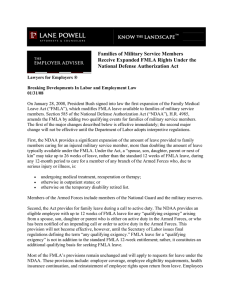
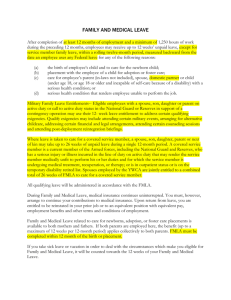
![(NPD-60) []](http://s3.studylib.net/store/data/007320126_1-47edb89d349f9ff8a65b0041b44e01a8-300x300.png)